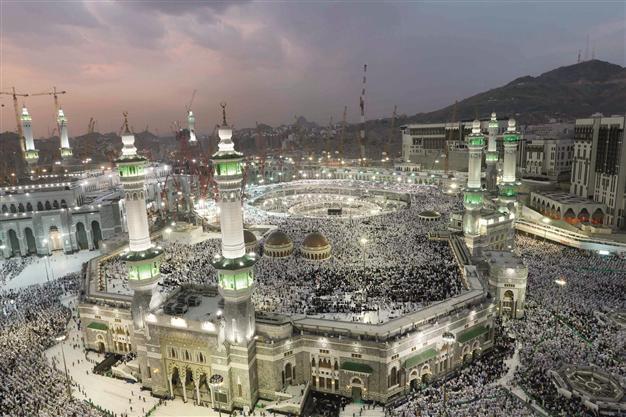Turkey’s top cleric slams Saudi Arabia over Mecca skyscrapers
Fatma Aksu MECCA

Muslim pilgrims pray around the holy Kaaba at the Grand Mosque during the annual Hajj pilgrimage to Mecca. Construction cranes are seen in the background. REUTERS Photo
The head of Turkey’s top religious authority has slammed Saudi Arabia over construction projects in Mecca, arguing that the holiest shrine of Muslims had been “overshadowed” by skyscrapers in a way that violates cultural norms and “destroys history.”“I told the Saudi minister of the Hajj that it is considered wrong in our culture to look down on the Kaaba. ‘Then how did you look over it while traveling with an aircraft [over Mecca],’ the Saudi minister asked me. Well, this is another point of view,” Professor Dr. Mehmet Görmez, the head of Turkey’s Directorate of Religious Affairs (Diyanet), told a group of journalists in Mecca on Sept. 29.
As millions of Muslims perform the Hajj, the annual Islamic pilgrimage to Mecca, the ongoing construction boom in oil-rich Saudi Arabia is again being questioned, particularly due to the transformation it has triggered around the Kaaba, a structure believed to have originally been built by Abraham, a prophet according to Judaism, Christianity and Islam. The cuboid building is at the center of Islam’s most sacred mosque, the al-Masjid al-Haram, which is now surrounded by several high rises, including the 260-meter-high ZamZam Tower.
According to Görmez, the Saudi minister, who he did not directly name, defended the high rises during a conversation when he visited Mecca with former Diyanet head Dr. Ali Bardakoğlu recently. “[The Saudis] had reserved a room for us on the 20th floor. I opened the window and my knees shook. So I went downstairs and tried to find myself a room there instead,” Görmez said.
“History is being destroyed on the Holy Land each day. I wish we were not experiencing a problem of de-historification in these lands. I wish we were able to protect history,” he said, suggesting that “the meanings behind symbols” in the Hajj were being eroded by mega projects.
Turkey’s top cleric also criticized those who pray only for themselves during the Hajj pilgrimage, complaining about a lack of will for the “collective good” among Muslims. “A misunderstood religion destroys all the potential of the human, while a rightfully understood religion is as natural as water and air,” he said.
Görmez touched on the question of Islamic extremism and the emergence of groups such as the Islamic State of Iraq and the Levant (ISIL), Boko Haram and al-Shabaab, repeating his recent criticism of ISIL.
“Unfortunately, the religion that once brought security to the world is now considered a security threat … Muslims stress external factors [for problems], but refrain from admitting internal reasons,” he said.
After admitting the importance of external factors such as colonialism and recent military invasions led by Western countries in the Islamic world, Görmez said Muslims must also solve internal problems such as education and prison systems that facilitate radicalization.
“As long as the relationship between life and religion is not constituted correctly, the division among Muslims will continue,” the Diyanet head said.
















